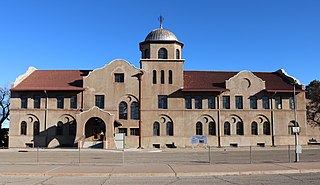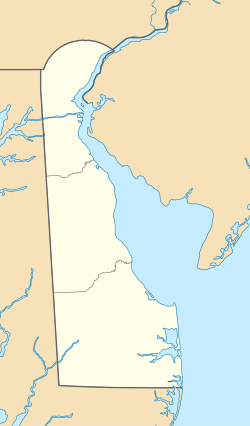
The Smithsonian Institution Building, more commonly known as the Smithsonian Castle or simply The Castle, is a building on the National Mall housing the Smithsonian Institution's administrative offices and information center. The building is constructed of Seneca red sandstone in the Norman Revival style. It was completed in 1855 and designated a National Historic Landmark in 1965.

A California Historical Landmark (CHL) is a building, structure, site, or place in the U.S. state of California that has been determined to have statewide historical landmark significance.

The National Park Service Southwest Regional Office, also known as National Park Service Region III Headquarters Building, is located at 1100 Old Santa Fe Trail in Santa Fe, New Mexico. The office provides support services for Park Service properties throughout the intermountain region of the American Southwest. The building, designed by NPS architect Cecil J. Doty, it is a traditional adobe building, built the 1930s by crews of the Civilian Conservation Corps. It is the largest adobe office building in the nation, and a masterpiece of Spanish Pueblo Revival architecture. It was designated a National Historic Landmark in 1987. It is open to the public during normal business hours; tours are not normally given.

Shadow Lawn is a historic building on the campus of Monmouth University in West Long Branch, Monmouth County, New Jersey, United States. Built in 1927 for Hubert T. Parson, president of the F.W. Woolworth Company, it is one of the last large estate houses to be built before the Great Depression. It was designated a National Historic Landmark in 1985 for its architecture.

The New Mt. Moriah Baptist Church is located at 13100 Woodward Avenue in Highland Park, Michigan in Metro Detroit. It was built in 1922 as the Trinity United Methodist Church, in the Gothic Revival style. It was listed on the National Register of Historic Places in 1982.

San Estévan del Rey Mission Church is a Spanish mission church in the Roman Catholic Diocese of Gallupon the Acoma Pueblo Reservation in western New Mexico. Built between 1629 and 1641, it is one of the finest extant examples of hybrid Spanish Colonial and Puebloan architectural styles. It was named for Saint Stephen I of Hungary. The church was declared a National Historic Landmark in 1970, and is listed on the National Register of Historic Places. It remains a mission church and is part of the parish of San José de la Laguna in Laguna, New Mexico.

The Minnequa Steel Works Office Building and Dispensary are historic buildings in Pueblo, Colorado. The main office building served as headquarters of Colorado Fuel and Iron Company. The medical dispensary building served as a medical clinic for treatment of minor injuries and illnesses, and in later years, as both clinic and personnel office for the Colorado Fuel and Iron Company. Opened in 1902, the six-room Spanish Mission style building contained waiting, drug, consultation, surgical and storage rooms, in addition to sleeping and office quarters for attending physicians. In 1902, as the company payroll exceeded 5,000 employees, the Dispensary handled an average of seventy-five cases daily. As employee numbers grew, medical staff also began treating families of employees. The building was used as a medical building for mill employees until the early 1990s. The Minnequa Steelworks Office Building, built in 1901, served as company headquarters until the early 1990s. Here, many office functions occurred including purchasing, finance, payroll, engineering, and other administrative functions. The building complex was listed on the National Register of Historic Places in 2002, amended to the National Level of Significance of the National Register of Historic Places in 2008, and was designated a National Historic Landmark in 2021. Owned and operated by the Steelworks Center of the West, the medical dispensary building is the home of the Steelworks Museum of Industry and Culture, which opened on January 19, 2007. The museum's exhibits include the local history of coal mining, steel production, railroads, labor, and the impact of the Colorado Fuel and Iron Company on the region. The main administration building will serve as the second phase of the Steelworks Museum of Industry and Culture in the coming years.

The American Bank Note Company Building is a five-story building at 70 Broad Street in the Financial District of Manhattan in New York City. The building was designed by architects Kirby, Petit & Green in the neo-classical style, and contains almost 20,000 square feet (1,900 m2) of space, with offices and residences on the upper floors. The exterior consists of a main facade on Broad Street with two columns, as well as side facades with pilasters on Beaver and Marketfield Streets.

The William H. Wells House is a private residence located at 2931 East Jefferson Avenue in Detroit, Michigan. It was listed on the National Register of Historic Places in 1985.

Engine Company No. 2 is a firehouse located at 1313 Washington Street in Hoboken, New Jersey, United States. The firehouse was added to the National Register of Historic Places on March 30, 1984.

The former Eighth Precinct Police Station is a building located at 4150 Grand River Avenue in the Woodbridge Historic District of Detroit, Michigan, United States. It is the second-oldest police building in Detroit, and was designated a Michigan State Historic Site in 1973 and listed on the National Register of Historic Places in 1974. The building now houses the Detroit Castle Lofts.

The Paradise Historic District comprises the historic portion of Paradise developed area of Mount Rainier National Park. The subalpine district surrounds its primary structure, the Paradise Inn, a rustic-style hotel built in 1917 to accommodate visitors to the park. The Paradise Inn is a National Historic Landmark. Five other buildings are included in the district. The district was placed on the National Register of Historic Places on March 13, 1991. It is part of the Mount Rainier National Historic Landmark District, which encompasses the entire park and which recognizes the park's inventory of Park Service-designed rustic architecture.

The Des Moines Saddlery Company Building is an historic building located in downtown Des Moines, Iowa, United States. It was built in 1881 by J. Rubelman of Muscatine, Iowa. He choose to move his operation to Des Moines because of its location on two rivers and the 13 railroads that served the city. It was one of four saddlery firms in a two block area. Rubelman's company made saddles, harnesses and leather works for 20 years. In the years since it has housed a shoe maker, rubber company, stove manufacturer, glove company, the Krispy Kone Company and the Kaplan Hat Company. The later was also the name of the restaurant that was located on the first floor.

New Castle Leather Raw Stock Warehouse, also known as the Kaumagraph Building, is a historic warehouse building located at Wilmington, New Castle County, Delaware. It was built in 1917, and is a three-story, rectangular steel, concrete, and brick building measuring 100 feet by 200 feet and featuring a projecting roof cornice, flat roof, and large window areas. It is characterized as a fireproof industrial building in the commercial style of the early 1900s. It was originally built as a warehouse to store goatskins for a Wilmington kid leather manufacturer and later housed the plant and offices of a specialty printing firm.

Mission Brewery Plaza is a historic brewery building in the Middletown neighborhood of San Diego, California. The building was added to the National Register of Historic Places on July 6, 1989. It is also the name of a San Diego microbrewery which opened in 2007 and operates in a different neighborhood in San Diego.

The Newport Downtown Historic District encompasses the 19th century heart of Newport, New Hampshire, the county seat of Sullivan County. The district includes the major commercial and civic buildings which line Main Street between Depot Street and the Sugar River. The district was listed on the National Register of Historic Places in 1985.

The Scanlan Building, located at 405 Main Street in Houston, Texas, is an eleven-story, 76,403sq.ft building completed in 1909. Built on the site of the first official home of the president of the Republic of Texas, it was the first building of its size and type to be designed by a major national architect to be built in Houston, and set the style for future construction in the area. It is the only known office building in Houston which was designed by D.H. Burnham & Company of Chicago. The building was the first to be built higher than ten stories, breaking the limit preferred by Houston developer Jesse H. Jones.

The Checker Cab Building was built as a garage and office building located at 2128 Trumbull Avenue in Detroit, Michigan. It was listed on the National Register of Historic Places in 2019. The building has been rehabilitated into residences, and is now part of the Elton Park lofts.






















